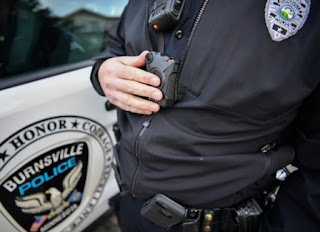Guest post by Lora Setter, LMCIT public safety coordinator
Listening to holiday music recently, I heard the announcer say that the holidays are “about peace, love, joy, and family.” Though I don’t disagree, for many people the holiday season can be anything but peaceful and joyful. This is especially true for first responders like police officers, firefighters, and emergency services personnel. For public safety people, the holidays may seem to be more about car accidents, DWI arrests, shoplifting calls, disputes, house fires, and other tragic events in the communities they serve.Along with challenging work, first responders can experience the same holiday stress that others may experience, such as the effect of shorter days and cold nights, strained relationships with family members, illness, potent reminders of grief and loss, and financial pressures.
Some ideas for keeping the holidays bright are:
- Prioritize and guard your sleep. Sleep is the most important component for mental wellness. This can be difficult with short staffing and holiday commitments, but make sure that in every 24 hours you spend at least seven hours getting good-quality sleep.
- Practice gratitude. Start each day thinking about three things for which you’re thankful. Studies prove that by doing this you help your brain by increasing dopamine and serotonin – the happiness hormones.
- Think about the important purpose of what you do as a public safety professional. Victor Frankl said, “Life is never made unbearable by circumstance, but only by lack of meaning and purpose.” The community counts on you to be there when they need help. It’s tough to miss a school concert, a family get-together, or a friend’s party because of work. Staying focused on the importance and purpose of the work you do can help you manage these tradeoffs.
- Check-in with yourself often. Ask yourself: Am I in touch with how I’m feeling? Am I watching too much TV? Drinking too much? Feeling cynical and angry?
- Talk to a trusted friend, spiritual advisor, or peer support person about how you’re feeling.
- Eat well. Many community members like to show their appreciation by dropping off cookies and other treats. Be sure to balance those treats with a healthy diet.
- Do your best to get at least 30 minutes of exercise every day. This is easier said than done during the busy holiday season. A brisk walk outside or a few laps around the shopping center count, too. If your department allows you to exercise on duty, take advantage of it to help maintain resilience.
- Reach out to others and promote connection. Ask a colleague how they’re feeling. Help colleagues feel connected and cared for.
- Take breaks from social media. Use the time for restorative practices such as meditation and mindfulness, or to be present with loved ones.
- Practice self-compassion. Talk to yourself like you would a friend. Maya Angelou said, “Do the best you can until you know better, when you know better do better.” Know that you’re doing the best you can.
- Try dwelling on the positive and not the negative. Our brains are wired to focus on negative events to keep us safe, especially when it’s your job to see what’s wrong with the picture. Take as many opportunities as you can to focus on the positives in your life. You’ll be doing your brain a much-needed favor.
- Set a budget for gift giving. Being financially strapped and working more to cover holiday bills can add to the stress of the season.
Best wishes for a happy, healthy holiday season and all through the year!


